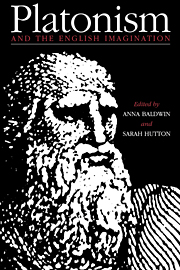Book contents
17 - Blake and Platonism
Published online by Cambridge University Press: 15 December 2009
Summary
‘There Exist in that Eternal World,’ says Blake, ‘the Permanent Realities of Every Thing which we see reflected in this Vegetable Glass of Nature’ (E555/K605). These words from his Notebook,which were penned in 1809 or 1810, agree with much that he wrote at least after about 1803. And it might be argued that they continue,with a different emphasis, certain themes from his earlier work respecting vision and imagination. Blake is among those poets who seem more obviously indebted to Platonism.The problem has always been to gauge the character and extent of that indebtedness. Some things, however, are clear: Blake must have read Plato in the translations of Thomas Taylor, who was familiar with members of his circle. He must also have read Taylor's commentaries and his translations of the Neoplatonists. From these he derives a Neoplatonic vocabulary – ‘Generation‘, ‘Non-Entity’, ‘Hyle’, ‘Forms Eternal’,‘Intellect’, and (with some twisting) ‘Emanation’ –which he uses not infrequently in his later work. These facts have led some scholars, notably George Mills Harper and Kathleen Raine, to see Blake as capable of being described, with only a degree of qualification, as a Neoplatonist. Their works demonstrate the incontestable fact of his detailed familiarity with the tradition. It might therefore seem wiser to take ‘Blake and Neoplatonism’ as our subject. However, Blake makes a number of comments on Plato, and a couple on Socrates,which make it clear that he thought he could form a judgement about the originators of Platonism to some extent independently of whatever he may have thought about their successors.
- Type
- Chapter
- Information
- Platonism and the English Imagination , pp. 186 - 198Publisher: Cambridge University PressPrint publication year: 1994
- 1
- Cited by



